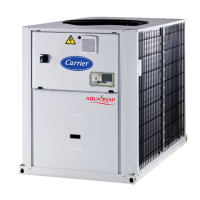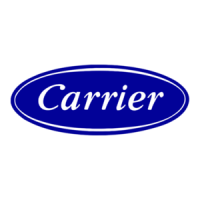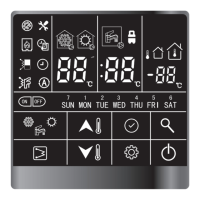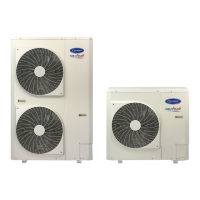30
30RQS/
RQSY
039
045
050
060
090
100
120
140
160
If the installation ow rate is below the minimum ow rate,
there is a risk of excessive fouling.
This is limited by the permitted water heat exchanger
pressure drop. Also, a minimum water heat exchanger ∆T of
2.8 K must be guaranteed, which corresponds to a water ow
rate of 0.09 l/s per kW.
10.6.1 - Minimum water loop volume
The minimum water loop volume, in litres, is given by the
following formula:
Volume (l) = CAP (kW) x N, where CAP is the nominal
cooling capacity at nominal operating conditions.
(See note)
This volume is required to obtain temperature stability and
precision. To achieve this volume, it may be necessary to add
a storage tank to the circuit. This tank should be equipped with
bafes to allow mixing of the uid (water or brine). Please
refer to the examples below.
For the Buffer Tank Module option, the tank volume must
be taken into account: 250 litres.
Bad Good
Bad Good
10.6.2 - Maximum water loop volume
Units with hydronic module incorporate an expansion tank
that limits the water loop volume. The table below gives the
maximum loop volume for pure water or ethylene glycol with
various concentrations.
30RQS/RQSY
1 2 3 1 2 3
litres 1741 1161
l 471 314 157 1373
l 130 1135 757
l 232 116 1014 676
l 562
30RQS/RQSY
1 2 3 1 2 3
litres 1741 1161
l 706 471 235 1373
l 1135 757
l 522 174 1014 676
l 434 145 562
If the total system volume is higher than the values given
above, the installer must add another expansion tank, suitable
for the additional volume.
Note : Take into account the buffer tank volume (250 litres)
Please refer to the certied dimensional drawings, supplied
with the unit.
The power supply must conform to the specication on the
heat pump nameplate. The supply voltage must be within the
range specied in the electrical data table. For connec-tions
refer to the wiring diagrams and the certied dimen-sional
drawings.
WARNING: Operation of the heat pump with an improper
supply voltage or excessive phase imbalance constitutes
abuse which will invalidate the Carrier warranty. If the
phase imbalance exceeds 2% for voltage, or 10% for current,
contact your local electricity supply at once and ensure that
the heat pump is not switched on until correc-tive measures
have been taken.
100 x max. deviation from average voltage
Average voltage
Example:
On a 400 V - 3 ph - 50 Hz supply, the individual phase voltages
were measured to be:
AB = 406 V; BC = 399 V; AC = 394 V
Average voltage = (406 + 399 + 394)/3 = 1199/3
= 399.7 say 400 V
Calculate the maximum deviation from the 400 V average:
(AB) = 406 - 400 = 6

